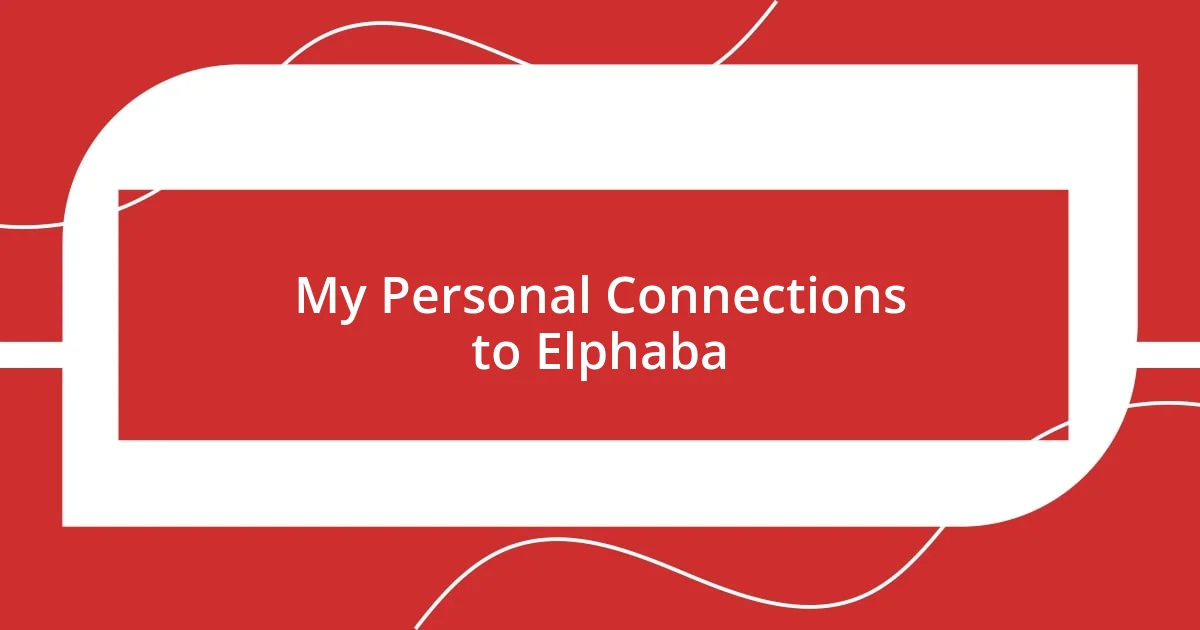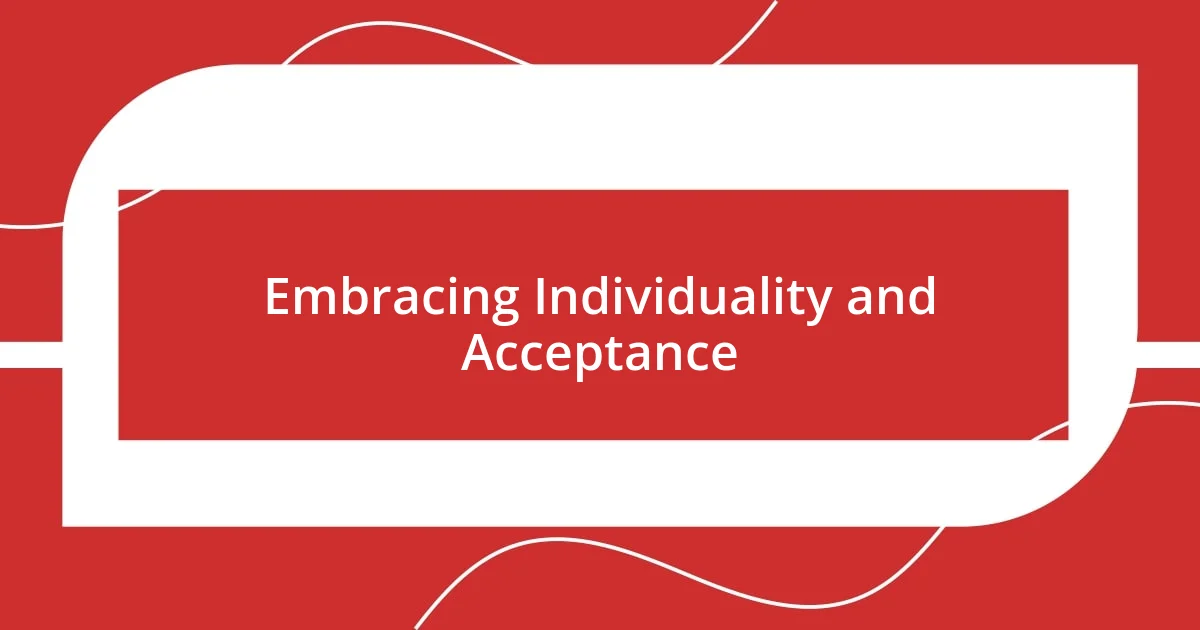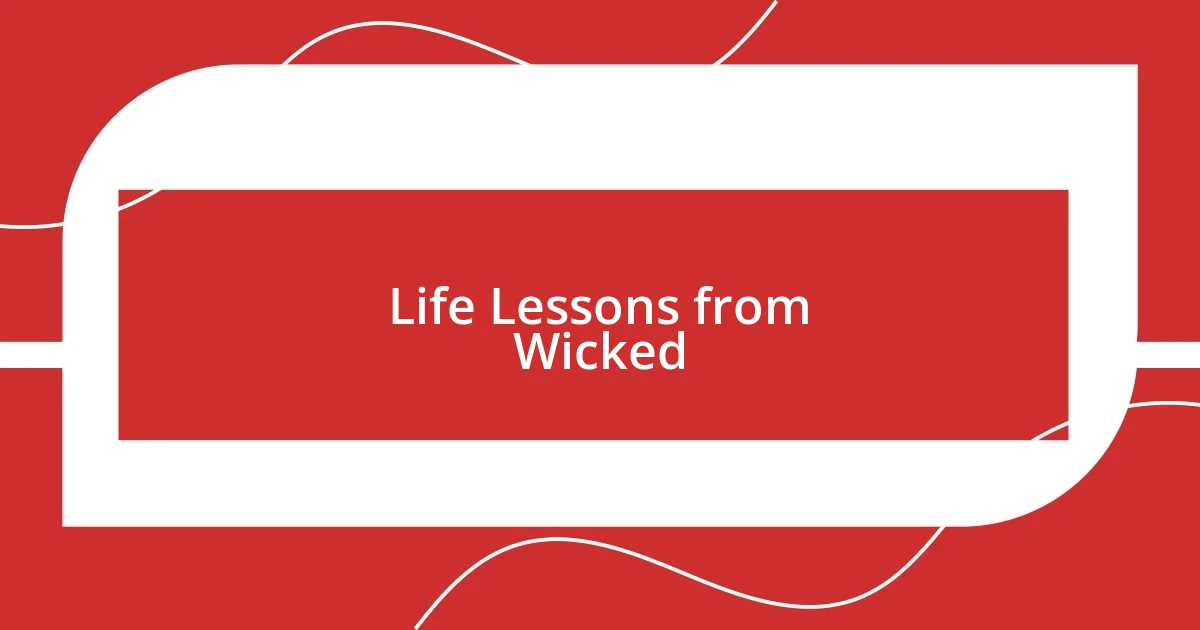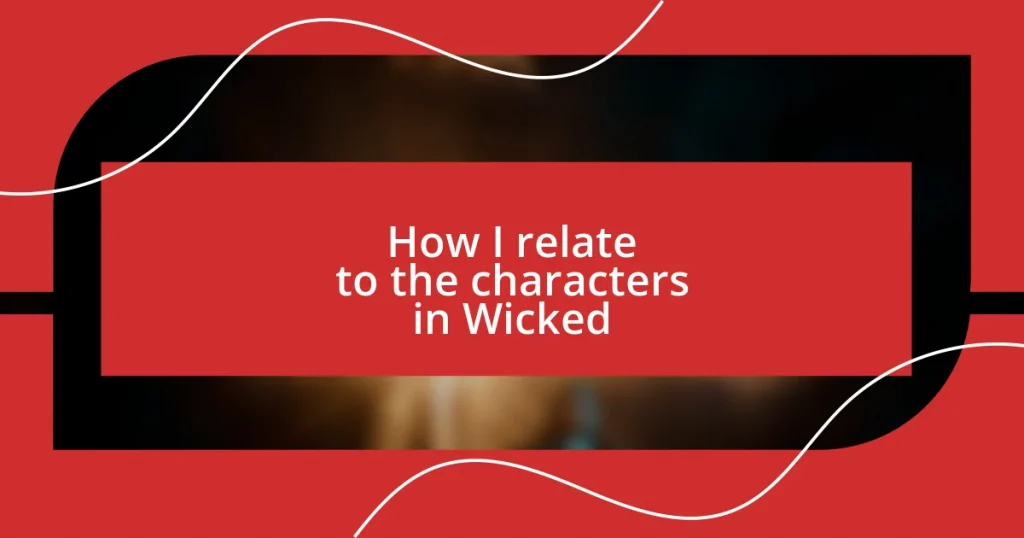Key takeaways:
- The complexities of good and evil are explored through characters Elphaba and Glinda, reflecting personal struggles with identity and societal pressures.
- Elphaba’s journey of embracing individuality and challenging injustice resonates with personal experiences of standing up for beliefs and finding voice amidst isolation.
- Glinda’s transformation highlights the importance of personal growth, authenticity, and the value of true friendship in navigating societal expectations.

Understanding Wicked’s Themes and Characters
What I find fascinating about Wicked is how it challenges our perceptions of good and evil. The characters, especially Elphaba and Glinda, embody the complexities of human nature. Have you ever felt torn between wanting to fit in and embracing your true self? I certainly have, and watching Elphaba’s journey made me reflect on my own struggles with identity.
Diving deeper, the theme of friendship stands out to me. Elphaba and Glinda’s relationship is a beautiful, albeit messy friendship that evolves throughout the story. I remember a time in my life when a close friend and I drifted apart due to our differing choices. It gave me a sense of what the characters experience—the pain of separation and the joy of reconnection, which resonates deeply.
Moreover, the societal pressures that the characters face are relatable. Elphaba’s rebellion against norms reminds me of moments when I questioned authority, whether it was in school or at work. Have you ever felt pressured to conform? I think these themes of resistance and acceptance are so effective in illustrating that it’s okay to stand out and fight for what you believe in, just as Elphaba does.

My Personal Connections to Elphaba
Elphaba’s character strikes a chord with me because I can relate to her journey of embracing individuality in a world that often pushes for conformity. I recall a period in my high school years when I felt different from my peers, much like Elphaba who stands out with her green skin. I vividly remember wearing an unconventional outfit to a party, and though it felt exhilarating, I also faced judgment. That made me empathize profoundly with Elphaba; she teaches us the importance of authenticity over acceptance.
Another aspect of Elphaba’s character that resonates with my experiences is her fierce determination to challenge injustice. I often think back to a time when I stood up for a colleague who was unfairly treated at work. Just like Elphaba confronted societal norms, I realized that voicing my beliefs could have genuine impact. Her tenacity inspires me to be brave in advocating for what I believe is right, reminding me that feeling uncomfortable can sometimes be a sign that we are on the right path.
Elphaba’s emotional struggles are a reflection of the relentless search for acceptance and belonging that many of us face. I remember dealing with feelings of isolation when I moved to a new city for a job. The fear of not fitting in loomed large, but like Elphaba, I learned to find my voice and create my own space. Her story illustrates that the journey toward self-acceptance may be complicated, yet it’s ultimately rewarding, echoing the relatable essence of her character.
| Personal Connection | Elphaba’s Representation |
|---|---|
| Embracing individuality | Struggles against conformity and judgment |
| Standing up for justice | Fighting against societal norms |
| Search for belonging | Journey toward self-acceptance |

Relating to Glinda’s Journey
Glinda’s journey is particularly relatable to me, as it captures the struggle of balancing societal expectations with personal desires. I remember the pressure I felt during my college years to always be the “popular” one, even when it meant suppressing my true interests. Watching Glinda transform from a shallow, fame-seeking individual into someone who genuinely cares for others reminds me that growth often arises from vulnerability. This journey of self-discovery is a universal experience that many can resonate with.
- Emphasizes the journey of personal growth.
- Reflects on the complexity of friendship and loyalty.
- Illustrates the struggle of maintaining authenticity while seeking approval.
One defining moment in Glinda’s story that resonates with me is her realization that true friendship means standing by someone, even when it’s hard. I had a close friend who was going through a rough patch, and while some chose to distance themselves, I found it important to support her. That situation forced me to confront my own fears of being judged. Glinda’s evolution showcases the importance of inner strength and compassion, reminding us that real connections often require us to navigate uncomfortable emotions.

Embracing Individuality and Acceptance
Embracing individuality means celebrating what makes us unique, and I’ve learned this through my own experiences. There was a time when I felt pressured to conform to a particular style, convinced that blending in would make me accepted. Yet, when I finally decided to wear what truly represented me, I felt a surge of freedom. In doing so, I realized that being true to myself attracted people who appreciated me for who I am, rather than the facade I had presented.
Acceptance often comes hand-in-hand with vulnerability, and I find this echoed in the story of Elphaba. I vividly remember the moment when I shared my love for unconventional music with friends, fearing their judgment. The experience was nerve-wracking, but it sparked a deep conversation about personal tastes. Just like Elphaba’s journey toward being accepted as a green-skinned outcast, I discovered that authenticity can forge stronger, deeper connections, helping others feel safe in expressing their true selves.
In our quest for acceptance, we can forget that individuality should be celebrated, not shunned. I’ve faced moments where I felt misunderstood, especially when sharing my views on certain social issues. I often reflect on how Elphaba bravely stood up for her beliefs, which serves as a lasting reminder that embracing who we are, with all our quirks and differences, is the first step toward inspiring acceptance in others. Isn’t it in our most authentic moments that we truly connect?

Life Lessons from Wicked
In “Wicked,” one of the profound lessons I’ve taken to heart is the importance of empathy in understanding others. I once faced a situation where a new colleague seemed difficult and standoffish. Rather than writing her off, I took the time to sit down and listen to her story. What I discovered was a compassionate person navigating her own struggles, much like Elphaba, who often faced judgment despite her good intentions. This reinforces the notion that empathy can transform our perception of others and lead to meaningful relationships.
Another crucial takeaway from the story is the significance of resilience in the face of adversity. I remember tackling a significant setback when I didn’t get accepted into a program I had worked tirelessly for. Initially, I felt crushed, but like Elphaba, I learned to rise from disappointment. I engaged in self-reflection, ultimately discovering new passions that aligned more with my true self. I see this mirrored in Elphaba’s journey—her unwavering spirit amidst obstacles inspires us to turn our challenges into opportunities for growth.
Lastly, “Wicked” highlights the importance of questioning what we perceive to be true. I recall a time when I blindly followed a societal norm in my community, only to realize later how it conflicted with my values. This moment of reckoning pushed me to reassess not just my beliefs, but also the narratives I accepted without question. Just as Elphaba challenges the perspectives of those around her, I found that questioning can lead to greater self-awareness and empowerment. It begs the question: when was the last time you challenged a belief that you thought was unchangeable?















